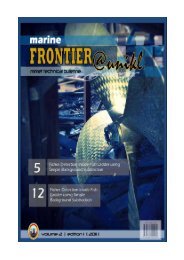click here to download - UniKL MIMET Official Website
click here to download - UniKL MIMET Official Website
click here to download - UniKL MIMET Official Website
You also want an ePaper? Increase the reach of your titles
YUMPU automatically turns print PDFs into web optimized ePapers that Google loves.
age and appropriate steps must be taken <strong>to</strong> con‐<br />
tain the spillage from polluting soils or under‐<br />
ground water sources. The seriousness of the<br />
regulation can be demonstrated by a spill incident<br />
at a site own by the Brookhaven National Labora‐<br />
<strong>to</strong>ry (BNL) in New York. A ruptured hydraulic hose<br />
has resulted in the removal of 50 cubic yards of<br />
contaminated soil and disposed as <strong>to</strong>xic material.<br />
This incident has led BNL <strong>to</strong> adopt the usage of<br />
environmentally safer hydraulic fluid based from<br />
canola oil [2].<br />
In order <strong>to</strong> make a hydraulic fluid <strong>to</strong> be safer for<br />
the environment the hydraulic fluid must be read‐<br />
ily biodegradable or in other word the fluid must<br />
be able <strong>to</strong> be completely converted <strong>to</strong> carbon<br />
dioxide and water quickly and naturally by diges‐<br />
tion or consumption process by naturally occur‐<br />
ring organism in water, oil and soil systems [2].<br />
Any spillage can then be cleaned up normally<br />
without the added cost of hazardous material<br />
handlings.<br />
To obtain the biodegradable features, previous<br />
researches has lead <strong>to</strong> the application of synthetic<br />
base fluid such as synthetic esters and polyglycols<br />
(organophosphate and polyalphaolefin). These<br />
synthetics base fluids were developed mainly for<br />
high temperature and/or fire risk operations and<br />
are able <strong>to</strong> biodegrade easily compared <strong>to</strong> petro‐<br />
leum based fluids [3]. The synthetics based fluids<br />
perform better compared <strong>to</strong> petroleum based<br />
fluids in term of viscosity at low and high tem‐<br />
peratures, volatility, pour point, wear protections<br />
and oxidations [3]. However, synthetic esters are<br />
expensive <strong>to</strong> produce and even for their superior<br />
lubrication performance, the high costs limit its<br />
usage. Polyglycols are less costly but can be quite<br />
<strong>to</strong>xic <strong>to</strong> living organisms especially when mixed<br />
with lubricating additives [3,4].<br />
<strong>MIMET</strong> Technical Bulletin Volume 1 (2) 2010<br />
Thus, a cheaper non <strong>to</strong>xic alternative <strong>to</strong> be used is<br />
vegetable oil as the base oil for hydraulic fluids.<br />
Among vegetable oils which has been researched<br />
and developed as hydraulic fluids are the canola oil,<br />
rapeseed oil, soybean oil and palm oil.<br />
Properties of Hydraulic Fluid<br />
Primary purpose of hydraulic fluids is <strong>to</strong> maintain<br />
lubrication and fluid characteristics while in use<br />
within the system so as <strong>to</strong> maintain appropriate<br />
pressure <strong>to</strong> operate hydraulic actua<strong>to</strong>rs (cylinders<br />
and mo<strong>to</strong>rs) assemblies in machineries on demand.<br />
An ideal hydraulic fluid will have the following char‐<br />
acteristics [3, 5,6]:<br />
Viscosity<br />
1. Constants viscosity at all temperature<br />
range<br />
2. High anti‐wear characteristics<br />
3. Thermal stability<br />
4. Hydrolytic stability<br />
5. Low chemical corrosiveness<br />
6. Low cavitation tendencies<br />
7. Long life<br />
8. Fire resistance<br />
9. Readily biodegradable<br />
10. Low <strong>to</strong>xicity<br />
11. Low cost<br />
For hydraulic fluids, the temperature effect on<br />
viscosity is very important. A good fluid can main‐<br />
tain a minimum required viscosity at high operat‐<br />
ing temperature yet does not become <strong>to</strong>o viscous<br />
at lower temperature. Too much viscosity may<br />
result in difficulty for the fluid <strong>to</strong> transmit hydrau‐<br />
lic power at low temperature especially at system<br />
start.<br />
Anti Wear<br />
The ability of the fluid <strong>to</strong> coat moving metal parts<br />
with a thin protective oil film. The oil film will re‐<br />
| MARINE FRONTIER @ <strong>UniKL</strong><br />
63



